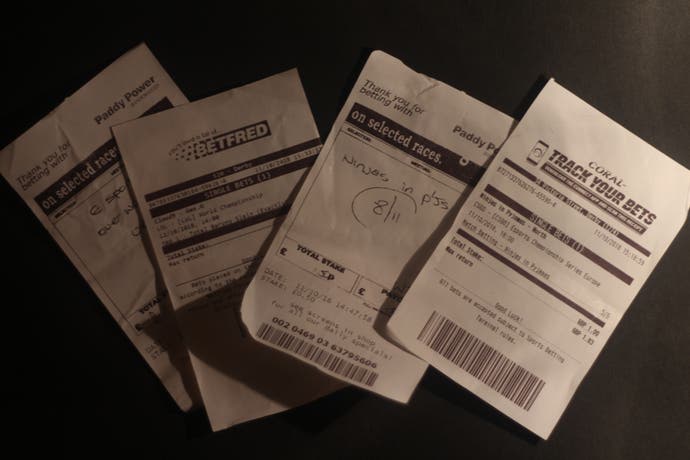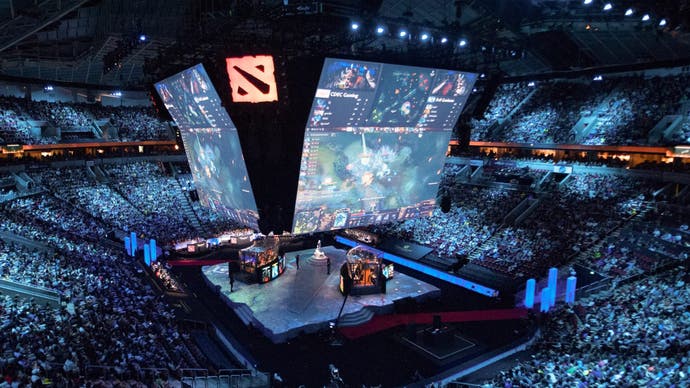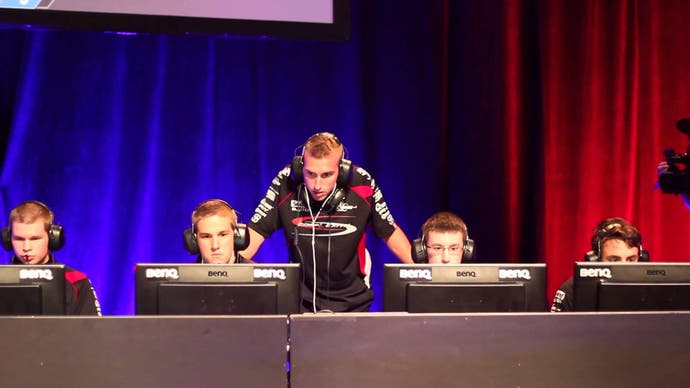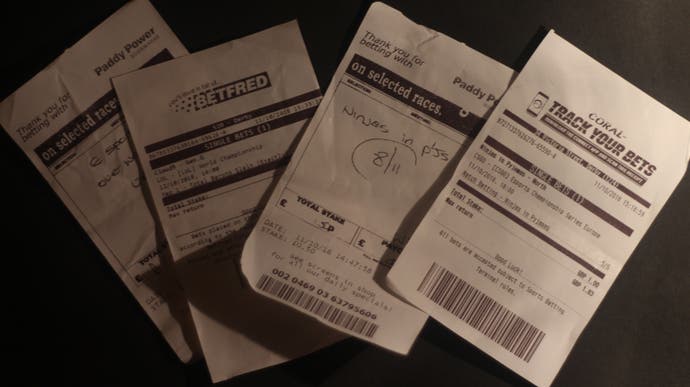Here's what happened when we tried to bet on esports at our local bookies
"What kind of game is Ninjas in Pyjamas?"
We have an odd relationship with gambling in the UK. You'd be hard-pressed to find a high street or city centre that doesn't have at least a couple of bookmakers' shops mixed into it, offering bets on everything from horse racing and football to whether or not Kate Winslet will cry if she wins an Oscar (yes that was a real thing). But how does esports fit in?
According to a recent study by the UK's Gambling Commission, the percentage of British adults who have at some point in their lives placed a bet on esports is 8.5 per cent, with three per cent having placed those bets in the month the study was conducted. That's a surprising statistic for a sport many consider to be still quite niche. And it makes sense most of those bets will be online, given the nature of esports and the audience for it. But it also got me wondering: just how easy it is to walk into a betting shop and wager some cash on an esports event?
To find out, I picked three (at the time of betting) upcoming and current events to bet on, with the intention of gambling on three specific teams to win either the tournament or a particular match. These were Team Liquid to win the ESL One Dota 2 tournament, Ninjas in Pyjamas to win that day's ECS CS:GO season six game, and for the Overwatch World Cup, I had to back the home nation and bet on the UK. Secondly, I decided I had to be able to place the bet in store. We all know you can bet on esports online, so that didn't count.
Here's what happened.
My first stop is Ladbrokes. This one is, to me at least, the quintessential UK bookmakers and as soon as I step in, I can practically taste the decades old nicotine still clinging to the wallpaper. This is the vibe I expect from a bookies, and I'm feeling confident as I step up to the counter. Perhaps, I wonder, I might win some money!
"Hi, I'm wondering if you do esports betting in here," I earnestly chirp to the guy behind the till. "What's esports?" he says back to me, with a look that suggests I've just requested a battered sausage and large chips. Alas, I get no joy from Ladbrokes. The staff do point out that I can probably place these bets online, but we already knew that.

Next up is William Hill, another old-school betting shop. I have a mate who used to work here, and he tells me all kinds of crazy stories about how you can bet on everything from Gaelic Football to Celebrity Big Brother. I'm quietly confident as I push open the doors and take in the atmosphere of horse racing commentary and angry men beating up fruit machines. I step up to the counter and... another dud.
The staff, who were lovely, say I could absolutely bet on the Great British Bake-Off, what the next royal baby will be called, and pretty much any other inane, bizarre event, but not esports. However, they say Paddy Power are kind of the new guys on the block when it comes to bookies, so maybe they'll be a bit more bohemian.
With that in mind, my next stop is Paddy Power. Alas, I'm snubbed again, with a nice lady telling me they don't do stuff like that. At this point, I seriously consider giving up. Perhaps I overestimated how big of a deal esports is. I ask what the usual process is when somebody walks in and wants to place a bet on an event they don't have the odds for. "Well, I usually call up head office and a guy there gives me the odds," she replies. "Can we try it?" I ask. So she picks up the phone (probably just to humour me) and surprisingly it turns out they have odds for just about every major gaming event.
Over the next 10 minutes, she scrolls through all of the games Paddy Power takes bets on. "What's CS:GO?" she asks, "are they a team"? "No," I reply, "it's a game called Counter Strike: Global Offensive." "What about LOL?" she asks. "League of Legends," I respond. "Dota?" she inquires. "Yeah," I begin, "for some reason we like to abbreviate everything in this hobby."
She then raises an eyebrow before asking, "what kind of game is Ninjas in Pyjamas?" "That one is actually a team," I reply. She looks at me with confusion on her face, before shrugging it all off. I walk out of Paddy Power having managed to place a bet on both Ninjas in Pyjamas and the UK Overwatch team (although at 33/1, it seems they're not exactly favourites to take the World Cup home). Still, two out of three isn't bad at all.

Full of confidence, I trundle over to my penultimate stop, Coral. For some reason, this has managed to fly under my radar my entire adult life. As it's called Coral, I just kind of assumed it sold bubble bath and scented candles or something. Inside, a friendly lady excitedly informs me they do take bets on esports, but only via a little computer terminal in the corner. She also proudly informs me this is a new thing, only a few weeks old. Given I'm the youngest person in here by what looks like 20 years, it's entirely possible I'm about to be the first punter to test-drive this new system. How exciting!
I find it difficult to deal with, mainly because the only events available to bet on are those happening today, and most of them have already begun or finished. There's only one event that's available, and fortunately it's Ninjas in Pyjamas again. So Coral just scrapes a point out of it.
My journey is almost over. I've seen everything. Confusion, rejection and near total success. Can the ridiculously named Betfred steal it at the last minute, or will it be just another Ladbrokes? Inside, I discover one of the employees is actually a League of Legends player. I quickly remind him Dota 2 is superior and he's a scrublord, before attempting to drop some bets.
Betfred has a similar system to Coral, where all of its esports gambling runs through a terminal in the shop. Unlike Coral, however, you can bet on all sorts of zany stuff. It's a shame it doesn't seem to have any of the three events I've selected, as the ones they do have let you bet on things like total number of kills, number of wards placed, and even the length of the game. I'm so impressed I decide to bet on an unrelated match between Cloud 9 and Gen G in the LoL league. I wager two barons will be slain during the game, as it seems like the most oddly specific thing to bet on.

I leave the shop and head home with four betting slips in my pocket, one from Coral, another from Betfred and two from Paddy Power. I'm honestly surprised by how much of a vast chasm of difference there are between these shops. Everything from a complete lack of knowledge of the existence of esports in Ladbrokes, to an absolutely enormous list of potential events in Paddy Power. It would seem these two worlds are still in the process of colliding, with the traditional bookies struggling to fully embrace the idea of esports as a serious scene.
This could just be the story of a quirky old institution struggling to move with the times, but according to the aforementioned study by the Gambling Commission, there's more going on here. For a start, there's a real possibility participating in an esports event for a fee may itself be considered gambling, given you are paying to play a game which, if you win, will result in you receiving a cash prize. Does this mean we can wager on someone's wager at the bookmakers?
According to the UK Gambling Commission, the line to draw between a sport and a wager is whether or not victory involves "an element of chance". There's a solid argument to be had that while many games are based purely on dexterity, timing and twitch reactions, some of them, like Hearthstone or even Dota 2, involve a huge amount of random number generation. This makes generating odds for a lot of esports events tricky on both moral and practical grounds. How can you account for randomness? Should you even be giving odds on something for which you have no objective basis for prediction?
Still, it isn't just the RNG that separates esports from other sporting activities. Competitive gaming lacks a cohesive governing body or anything that acts as the equivalent of football's FIFA or golf's PGA. The study (quite reasonably) argues esports is in even more need of a governing body than traditional sports, given how much easier it is to manipulate performance in a video game. Cheating or unfair play can come in any number of forms, from obvious stuff such as the use of hacks during live tournaments, to simply playing on more advanced hardware than your opponent. FIFA is able to ensure soccer is played in a controlled environment, determining crucial factors like what the acceptable dimensions of a pitch can be or how long a goalkeeper may handle the ball. This ensures that when a team from Germany travels across the world to play in Peru, the two sides are on an equal, fair footing. The lack of any real regulation, or perhaps more accurately, the fact parameters are often determined on an event-by-event basis, again makes generating fair odds extremely difficult for a bookmaker.

This lack of regulation has also opened the door to an arguably even bigger issue regarding children and gambling. In late 2016, the FUTGalaxy controversy forced the industry to acknowledge some businesses were exploiting the open nature of video game economies to offer players opportunities to buy and sell in-game items. What's worse is these sites were marketed directly at children and heavily supported via the use of social media. The Gambling Commission described this particular case as "one of the most serious that has been investigated", and stated "the defendants knew that the site was used by children and that their conduct was illegal". Ultimately, the study concluded: "children are readily able to access activities commonly accepted as being appropriate only for adults."
However, speaking to Dan Wood, COO of UK-based games industry trade body Ukie, a slightly different angle emerges. Wood was part of a team that authored a government report on how the UK esports scene might be grown. "We looked into whether there was need for an esports governing body and found that, as esports is evolving incredibly fast, across multiple international territories and many different games and leagues, there was not currently any need for one."
Wood describes the games industry as "self-regulating" and rightly points out the combined efforts of publishers and tournament organisers already perform the role of a traditional governing body. It's a fairly reasonable stance, which is backed up by the fact that, unlike two games of football, two random esports matches are likely to be entirely different games, with completely different rules and required skill sets.
Ukie also published an official response to the UK Gambling Commission's paper. While they admit RNG will always be an inherent part of video games, they also point out it's both unfair and incorrect to compare a game such as blackjack or poker to a game such as Hearthstone. For a start, you build your own deck in Hearthstone, indicating how the importance of skill manifests itself even before the games begin. The response concludes that when compared to a casino-style game, "skilled players of video games have considerably more control over the outcome of their match."

Ultimately, it's difficult to know exactly why the local bookies, with all of its resources and contacts, is somehow unable to stay on top of esports as a serious betting sport. Perhaps this really is just the tale of a quirky old institution struggling to move with the times, yet I find that hard to accept. If this journey has taught me anything, it's that the UK is engaged in constant debate about the role of esports in our ever-changing economy, both on the streets of our cities and in the boardrooms of our corporations. Furthermore, with major competitions now being hosted in the UK, such as next year's ESL One Dota 2 tournament, this little collection of rainy islands that I call home is fast becoming a hub for serious competitive gaming.
Dan Wood is committed to making esports a hit in the UK. He sees the nation as having "all the ingredients in place to become a global hub", citing our tendency to adopt new technology and our proud history of game development at a grassroots level. Personally, I just want to be able to walk into a betting shop one day and assume none of the staff will ask, "what's esports?" When that day comes, we will have truly made a sport out of our hobby.
UPDATE: Some of you have wondered whether I won with my esports bets or not. Ninjas in Pyjamas totally let me down, as did Team UK in the Overwatch League. However, the match between Cloud 9 and Gen G did indeed produce two slain Barons, netting me a whopping £3.33 in winnings. Therefore, I will now be announcing my retirement from the exhilarating world of esports betting, celebrating with a six inch tuna mayo from Subway.

